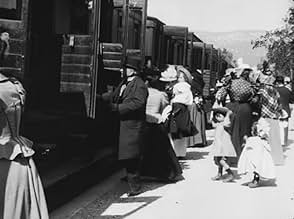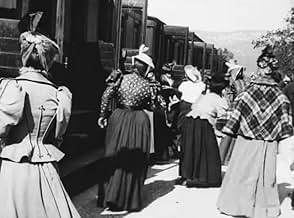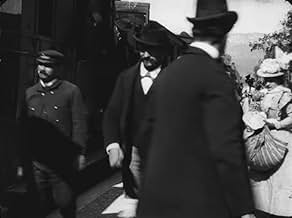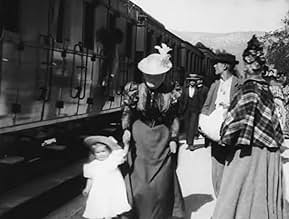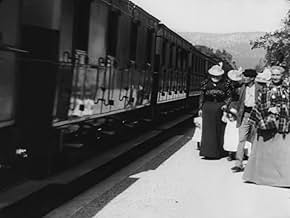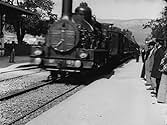A train arrives at La Ciotat station.A train arrives at La Ciotat station.A train arrives at La Ciotat station.
Featured reviews
I have little to add to other reviewers, except to say that this film took a sudden importance in my life last year. In 2002 I was travelling by train to my first ever Cannes Film Festival. At one point the train was moving slowly and I looked out of the window and found that we were pulling through La Ciotat, and the platform hadn't changed a bit. Sadly the train didn't stop, otherwise I would have been tempted to jump off for a moment, but given the purpose of my journey I felt a strange thrill at being there. Just a little personal anecdote, but perhaps it shows something of the power and importance of those early steps in film.
A train arrives at a station. And changes everything.
There isn't a lot to really say about L'arrivée d'un train a La Ciotat as a film itself. It's under a minute and shows a train pull up at a busy station. But what it signifies is another thing altogether. When we see that train come closer and closer until it stops in the station, on a surface level we watch a train arrive but it actuality what we are really witnessing is cinema arrive. This short film may not be the earliest movie but it is the first iconic image of the moving picture age.
Auguste and Louis Lumière weren't really artists. Their early films don't stand up to the highly imaginative work of George Méliès for example. But they still remain enormously important cinema giants. Not for the content of their films but for the fact that they kicked things off in the first place and produced the first iconic moment in cinema history. And for this reason L'arrivée d'un train a La Ciotat will always be remembered. Everyone who has a love of cinema should really take a minute of their time to pay homage to the first moment in an amazing journey.
There isn't a lot to really say about L'arrivée d'un train a La Ciotat as a film itself. It's under a minute and shows a train pull up at a busy station. But what it signifies is another thing altogether. When we see that train come closer and closer until it stops in the station, on a surface level we watch a train arrive but it actuality what we are really witnessing is cinema arrive. This short film may not be the earliest movie but it is the first iconic image of the moving picture age.
Auguste and Louis Lumière weren't really artists. Their early films don't stand up to the highly imaginative work of George Méliès for example. But they still remain enormously important cinema giants. Not for the content of their films but for the fact that they kicked things off in the first place and produced the first iconic moment in cinema history. And for this reason L'arrivée d'un train a La Ciotat will always be remembered. Everyone who has a love of cinema should really take a minute of their time to pay homage to the first moment in an amazing journey.
On December 28, 1895, at Paris's Salon Indien Du Grand Café, the brothers Auguste and Louis Lumière transformed the industry of entertainment when they did a demonstration of their new invention. The brothers projected a series of images on a screen, but those images were nothing like a normal slide-show, those images were moving as if they were alive. While the idea of motion pictures wasn't new to the audience (Edison's Kinetoscope was a popular entertainment), the devise's ability to project them on a screen was something they had never seen before. 10 short films of barely a minute of duration each were shown that day, and the invention proved to be an enormous success for the brothers, so immediately they decide to keep making movies in order to improve their catalog. One of those new movies would become the first iconic image of the new art.
"L' Arrivée d'un train à La Ciotat" (literally, "Arrival of a Train at La Ciotat") is without a doubt, one of the most famous films in history, as its image of a train arriving to the station, passing very close to the camera as it slows its speed, quickly became an iconic scene of the new invention. While initially conceived as just another one of the brothers' many "actuality films", it's clear that director Louis Lumière knew exactly where to put his camera in order to get the best image of the event as the film shows he had a good idea of the use of perspective (many consider it a study about long shot, medium shot and close-up). As a side-note, this is the film that originated the classic urban legend about people running away scared from the arriving train, thinking it was a real locomotive what was appearing on the screen.
While this famous tale has been debunked by historians as a fake story, it's existence is another testament of this movie's importance and continuous influence on the younger generations. Among the many different art-forms that we can find today, cinema is perhaps the one that better reflects the modern society that arose after the industrial revolution of the 19th Century; because, as painting and sculpture did before, it has become a keeper of the most representative icons of our history. "L' Arrivée d'un train à La Ciotat" was not the first movie the brothers screened, and it definitely wasn't the first movie ever made, but despite those details, the image of the arriving train represents the first icon of cinema, and literally, the arrival of a new art form. 9/10
"L' Arrivée d'un train à La Ciotat" (literally, "Arrival of a Train at La Ciotat") is without a doubt, one of the most famous films in history, as its image of a train arriving to the station, passing very close to the camera as it slows its speed, quickly became an iconic scene of the new invention. While initially conceived as just another one of the brothers' many "actuality films", it's clear that director Louis Lumière knew exactly where to put his camera in order to get the best image of the event as the film shows he had a good idea of the use of perspective (many consider it a study about long shot, medium shot and close-up). As a side-note, this is the film that originated the classic urban legend about people running away scared from the arriving train, thinking it was a real locomotive what was appearing on the screen.
While this famous tale has been debunked by historians as a fake story, it's existence is another testament of this movie's importance and continuous influence on the younger generations. Among the many different art-forms that we can find today, cinema is perhaps the one that better reflects the modern society that arose after the industrial revolution of the 19th Century; because, as painting and sculpture did before, it has become a keeper of the most representative icons of our history. "L' Arrivée d'un train à La Ciotat" was not the first movie the brothers screened, and it definitely wasn't the first movie ever made, but despite those details, the image of the arriving train represents the first icon of cinema, and literally, the arrival of a new art form. 9/10
The other reviewers are correct that this is a remarkable piece of history, but it is not the first movie. What film earns that honor depends partly on how you define movies. If you consider Edison's Kinetoscope shorts to be movies, the first movies were from 1893. And even before Edison, there had been some experimentation with projected motion pictures. Even if you give the Lumiere brothers credit for inventing the form (which is a very reasonable decision, but not an inevitable one), I believe their first film was "Workers Leaving The Factory" (aka " Sortie des usines Lumière, La (1895) ") Also, according to the "Oxford History of World Cinema", reports that terrified audience members hid under their seats when the film was first shown are probably apocryphal. Still, this (and the Lumiere brothers other early shorts) are well worth seeing for anyone who loves movies.
There doesn't seem to be anything particularly exciting about an approaching steam locomotive, but somehow this image has stuck, the first iconic scene in cinematic history. Produced by pioneering French filmmakers Auguste and Louis Lumière, 'L' Arrivée d'un train à La Ciotat / Arrival of a Train at La Ciotat' was filmed at La Ciotat, Bouches-du-Rhône, France on December 28, 1895 and first screened to a paying audience on January 6, 1896. The 50-second long film, like most other Lumière shorts, successfully captures a brief snippet of everyday life, chronicling the gradual approach of the train, its slow to a halt, and the disembarkment of its passengers.
For many years, there has been an enduring myth than, upon the first screening of the film, the audience was so overwhelmed by the image of the train bearing down upon them that they fled the room in terror. This has been shown to be something of an embellishment, and, though the film would undoubtedly have astounded and mesmerised audiences, there was never any real mass panic. French scientist Henri de Parville, who attended an early screening, is said to have written: "The animated photographs are small marvels. ...All is incredibly real. What a power of illusion! ...The streetcars, the carriages are moving towards the audience. A carriage was galloping in our direction. One of my neighbors was so much captivated that she sprung to her feet... and waited until the car disappeared before she sat down again." This, I think, adequately sums up how remarkable the film must have seemed back in 1896.
Auguste and Louis Lumière obviously recognised the power of illusion offered by their Cinématographe. In order to maximise the shock value of the approaching train, they have mounted the camera as close as possible to the edge of the platform, so that the audience feels as if they are almost standing right in the locomotive's path. The people departing from the train are just normal citizens going about their day (several Lumière relatives, however, can be spied on the platform), enhancing the realism of the short. Cinema does not get much more memorable than this.
For many years, there has been an enduring myth than, upon the first screening of the film, the audience was so overwhelmed by the image of the train bearing down upon them that they fled the room in terror. This has been shown to be something of an embellishment, and, though the film would undoubtedly have astounded and mesmerised audiences, there was never any real mass panic. French scientist Henri de Parville, who attended an early screening, is said to have written: "The animated photographs are small marvels. ...All is incredibly real. What a power of illusion! ...The streetcars, the carriages are moving towards the audience. A carriage was galloping in our direction. One of my neighbors was so much captivated that she sprung to her feet... and waited until the car disappeared before she sat down again." This, I think, adequately sums up how remarkable the film must have seemed back in 1896.
Auguste and Louis Lumière obviously recognised the power of illusion offered by their Cinématographe. In order to maximise the shock value of the approaching train, they have mounted the camera as close as possible to the edge of the platform, so that the audience feels as if they are almost standing right in the locomotive's path. The people departing from the train are just normal citizens going about their day (several Lumière relatives, however, can be spied on the platform), enhancing the realism of the short. Cinema does not get much more memorable than this.
Did you know
- TriviaPopular legend has it that, when this film was shown, the audience fled in terror, fearing being run over by the "approaching" train. This legend has since been identified as promotional embellishment, though there is evidence to suggest that people were astounded at the capabilities of the Lumières' cinématographe.
- ConnectionsEdited into Louis Lumière (1968)
Details
- Release date
- Country of origin
- Language
- Also known as
- L'arrivée d'un train en gare de La Ciotat
- Filming locations
- Production company
- See more company credits at IMDbPro
- Runtime
- 1m
- Color
- Sound mix
- Aspect ratio
- 1.31 : 1
Contribute to this page
Suggest an edit or add missing content

